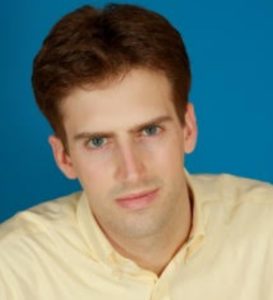LADI Interview Series #4: Get to Know Instructor Scott Wheeler
 Scott is the Head Coach of Policy and LD Debate at Peninsula High School. In Policy, his debaters have won the NSDA national championship, the Southern Bell Forum, and reached the semifinal round at the Tournament of Champions (TOC). In LD, he has had twelve students qualify for the TOC, winning many national tournaments and the Dukes and Bailey Cup. Scott has a BS in Communication from Northwestern and is an MA candidate in Pepperdine’s College of Communication.
Scott is the Head Coach of Policy and LD Debate at Peninsula High School. In Policy, his debaters have won the NSDA national championship, the Southern Bell Forum, and reached the semifinal round at the Tournament of Champions (TOC). In LD, he has had twelve students qualify for the TOC, winning many national tournaments and the Dukes and Bailey Cup. Scott has a BS in Communication from Northwestern and is an MA candidate in Pepperdine’s College of Communication.
Scott will be a Curriculum Director at this summer’s San Jose Debate Intensive. Learn more about Scott’s coaching philosophy, his thoughts on today’s LD trends, and what he’s looking forward to at SJDI in the following interview!
1. HOW HAS DEBATE CHANGED SINCE YOU FIRST STARTED COACHING? DO YOU THINK THESE DEVELOPMENTS ARE POSITIVE OR NEGATIVE?
I’m not really sure it has changed all that much, though I haven’t really been at it all that long (maybe in others’ minds, I have). The last couple years, I thought LD was moving towards being more progressive—with plans being acceptable and less of a focus on theory and dense philosophical frameworks that assume truth-testing. But that may have just been a reflection of who was winning recently, and the pendulum may have swung back a bit. Policy norms have trickled in, though. Disclosure practices have gotten better—particularly pre-round disclosure. Speech docs are also nice. I think that debaters from some schools have gotten a little better about collapsing, but there’s still a long way to go. Most rounds I judge still require a little work on my part to resolve, or else are decided by who has a better understanding of how the arguments work. But I have judged a few debates this year that I don’t think I would have seen three years ago.
2. YOUR STUDENTS HAVE HAD A LOT OF SUCCESS LATELY, BOTH IN POLICY AND LD. WHAT IS YOUR COACHING PHILOSOPHY, AND WHY DO YOU THINK IT’S BEEN EFFECTIVE?
I think just having high expectations is like 90% of it. Students tend to rise to the occasion (or maybe I’ve just been lucky). My background is in policy, so some of the LD success has just been having a better understanding of those arguments as they’ve become more common in LD. In policy, I try to stress tactics that maximize in-round strategic flexibility, but also putting pressure on your opponents by having offense on each flow and making bold moves before it’s one speech too late. The final rebuttal is also crucial, because you have to break down everything that is going on into a cohesive narrative. LD is very different because there is only one constructive. All links, impacts, etc. are in the first speech so there are many fewer arguments made in round. There’s much less argument development and most of the strategy goes into putting together the right strat, which is often more positional. The 1NC strat is obviously key in policy too but in LD it’s all you’ve got–there’s no block to develop anything or trick anything out. Because there are so few norms in LD, in some ways you have to know more things to be able to do it. People are more divergent in their ideas of what the event is supposed to look like. Despite that, you don’t have to be able to do any of it as well as you would have to in order to succeed in policy. In LD I guess I also stress a focus on prep compared to coaches of some other squads—though I’m not sure it’s as much a factor in students’ success as it should be, given the nature of others’ positions and the level at which the debates occur. I’d feel like a bad coach if students didn’t leave with an understanding of the nuances of the topic, though—there are other ways to measure success than winning tournaments.
3. WHAT ADVICE WOULD YOU GIVE TO YOUNG DEBATERS TRYING TO IMPROVE?
Being on the LADI website is a good start. You really have to seek out all of the advice you can but there is a lot of misinformation out there. If you have a coach, listen to them. And seek out their advice—you aren’t their only student so you won’t get as much out of them if you aren’t proactive. If you’re emailing them with things you want to go over in class and coming into class with redoes ready to give, you will get the most out of their time and they will start thinking of you as someone to notice. You also have to be willing to get feedback that isn’t always positive. If you are too shy to get their honest advice because it might not be positive, you’re not going to improve. If you don’t have a coach, it’s harder to really know what to say. The most important thing is the same for everyone—go to tournaments. Go to every tournament you can, take notes after your round, try to really take the advice to heart rather than taking shortcuts that improve your record in the short-term without really making yourself better. A lot of students complain about their coach or the size of their program or lack of access to prep but then they’re going to like two tournaments every three months, so how important is debate to them really?
4. YOU’RE A CURRICULUM DIRECTOR AT SJDI. WHAT MAJOR DEBATE CONCEPTS DO YOU THINK STUDENTS MOST NEED IMPROVEMENT ON? WHAT IS YOUR PROCESS FOR TEACHING THESE CONCEPTS?
Having a big picture understanding of the round. This requires organization. I’m always surprised by how much prep is taken by the 1NC when the aff isn’t new. (Presumably the CX answers weren’t too jarring.) The 2NR then goes for everything and began with only thirty seconds of prep anyway so a good speech was already out of the question. Students need to put themselves into judges’ shoes. Arguments aren’t “entered into evidence” for the judge to peruse after the round. The final rebuttal is a narrative. You’re telling a story. Putting together a strat pre-round requires working backward—what are the possible winning 2ARs/2NRs and which is most preferred? What might happen during the round that requires a pivot? Students get too bogged down with highly technical stuff without thinking through the implications of winning the arguments they are fighting over. If past is prologue, I may need to spend more time at camp helping students to develop technique and thorough understanding of debate concepts than working with students on rebuttals and round vision that are a little more advanced. But the process for improving is no big secret—it’s rebuttal redoes.
5. WHAT ARE YOU MOST LOOKING FORWARD TO ABOUT TEACHING AT SJDI?
Not sure what to expect since it will be a new experience for me, but I am looking forward to working with some of the faculty. It will be fun to see some of my former students in a teaching capacity—my little children all grown up.
6. TIME FOR A FUN ONE. WHAT EXISTENTIAL RISK ARE YOU MOST AFRAID OF?
Well according to Bostrom I should be most concerned about intentional misuse of nanotechnology. But Trump wasn’t one of the impacts in that article so I’m not sure where he would have ranked. Based on some impact cards I read in the fall the next four years might be pretty scary.
